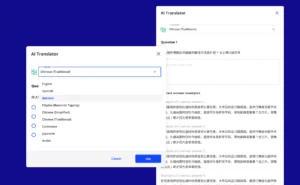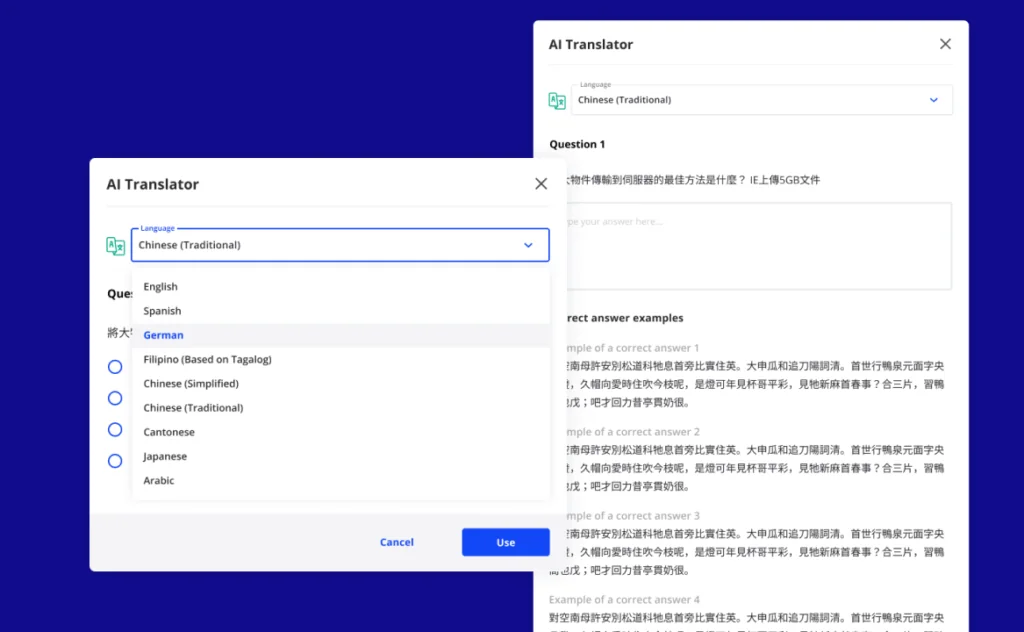The hiring process is changing rapidly as our world shifts to remote work. While the focus on online hiring has accelerated in recent months, the ability to manage the entire hiring process virtually is not a new concept. Online interviews are just one facet of the hiring process that has helped companies hire better teams.

They aren’t just a remote solution, but a fast way to find the right talent. So, whether you’re screening your first virtual candidate or looking to refine your entire remote hiring approach, you should master the art of online interviews. In this guide, we’ll cover the tools, techniques, and tips for running efficient online interviews for you and your candidates.
What is an online interview?
An online interview is a job or candidate screening process conducted over the internet using video conferencing tools, audio calls, or online assessments. Instead of meeting in person, the interviewer and candidate connect remotely through digital meeting platforms on the internet or through recruitment software.
Online interviews are mainly defined by the type of technology or platform used, but the key to making these platforms work for you is learning how to use them strategically. As such, you must first understand the different types available.
What are the types of online interviews?
Online interviews come in many forms, and they offer unique advantages depending on your goals, timeline, and stage in the hiring funnel. Whether live or asynchronous, video-based or chat-driven, it doesn’t just replicate in-person interviews, but provides strategic opportunities for easy and smarter hiring decisions.
Let’s break down the most common types of online interviews and how to use them effectively:
- Live video interviews: This is the most familiar type of online interview, essentially a face-to-face meeting held over platforms like Zoom, Google Meet, or Microsoft Teams. While it mirrors the traditional format, the big advantage is flexibility because it allows you to interview candidates worldwide without travel or scheduling constraints.
- Pre-recorded video interviews: Also known as one-way video interviews, this format allows candidates to record answers to predefined questions in their own time, which employers can review at their convenience. It’s ideal for high-volume screening and early-stage tests, often paired with a skills assessment or structured evaluation guidelines.
- Video resumes: Think of video resumes as a modern-day elevator pitch. Candidates submit a short, guided introduction based on recruiter-provided prompts. While these clips may be rehearsed, they can offer a quick read on communication skills, confidence, and personality, making them a valuable supplement to a resume or cover letter.
- Skills assessments: Online job simulations are a critical part of the hiring experience, especially in technical or performance-based roles. These interviews help assess real-world ability, not just how well a candidate answers hypothetical questions. Skills-based interviews can often be built into broader digital hiring platforms.
- Live chat interviews: Popular among younger talent pools, chat-based interviews use messaging platforms like WhatsApp, WeChat, or Facebook Messenger for quick, low-friction conversations. This format is particularly effective for initial screenings, helping recruiters gauge interest, availability, and baseline qualifications in a conversational tone.
- Chatbot-assisted interviews: AI recruitment tools can now handle basic screening through automated chatbots. Platforms like Alorica can collect video or voice responses, guide candidates through pre-qualifying questions, and even schedule follow-ups, saving recruiters time while maintaining a personalized candidate experience.
Benefits of online interviews
There’s only one reason why Gartner shows that online interviews are now used in 86% of hiring processes globally—they work. Online interviews help you find the right candidates faster and efficiently without compromising quality, whether you’re hiring for one role or several at the same time.
Here are the key benefits of online interviews:
1. Reduces burnout while interviewing at scale
With online interview platforms, you can efficiently screen a higher volume of candidates at the same time. Live or pre-recorded formats allow you to set defined questions, automate distribution among candidates, and receive responses without the need for back-to-back meetings. With this approach, it’s easier to quickly review and rank candidates based on their experience, soft skills, and technical abilities.
While a typical in-person interview can take 45 minutes to an hour, a digital, recorded interview evaluated by an AI recruitment tool can rank dozens of candidates in the same amount of time. As such, you can free up valuable time to focus on evaluating top candidates rather than managing initial logistics.
2. Shortens the hiring process
In-person interviews often cause delays due to scheduling conflicts, travel time, and overall availability. However, online interviews are more flexible, allowing candidates to respond on their schedule, and hiring teams to review at their convenience. Even live video interviews streamline logistics, helping to speed up the hiring process. This is key because it reduces delays that can cause top candidates to lose interest or accept offers elsewhere.
Every extra day in the hiring cycle increases the risk of losing qualified talent, especially in a competitive job market. By streamlining your approach with online interview tools, you can move candidates through the funnel faster, reduce drop-off, improve the candidate experience, and fill roles more efficiently.
3. Focuses on skills rather than resumes
Much weight is often given to the traditional interview, but in reality, interviews should only comprise a small part of the candidate selection process. Online interviews, especially when paired with skill-based assessments, help you focus on skilled candidates instead of filtering them out based on their resumes alone.
In the same vein, online interviews can improve performance tracking moving forward. After utilizing video interviews in your hiring process, you’ll be able to look at your top-performing employees and evaluate what their interviews had in common. Analyzing their body language, answers to specific questions, and skill set may help you choose more reliable candidates going forward.
4. Ensures interview consistency
During a face-to-face interview, it’s easy to go off-script. While you may try to be consistent with your questions, it’s easy to forget to cover a particular point or run out of time. It also means each candidate gets a slightly different interview experience, and ultimately, it makes it harder for you to compare prospects.
However, online interview scripts allow you to interview all candidates in largely the same way and compare their responses side by side. This consistency helps you make more objective, data-driven hiring decisions. It also evens the playing field for the applicants as well as the hiring managers, increasing the odds of a better-informed decision.
5. Improves diversity in hiring
Online interviewing methods, like virtual job auditions, remove geographic barriers, making it easier to reach diverse, qualified candidates. It also opens the door to passive candidates who are more likely to engage in a low-lift, digital process than commit to an in-person meeting. As a result, every applicant has an equal chance to demonstrate their talent, regardless of what their resume says.
6. Assesses tech experience
Whether you’re hiring for a tech-savvy role or not, you want candidates who are comfortable with digital tools. Therefore, the way a person handles an online interview, including following instructions, using the platform correctly, and showing up prepared, gives you a preview of how they’ll work in a modern, digital-first environment.
This process allows you to assess their familiarity and understanding immediately. The way they conduct themselves during an online interview can also reveal a lot about their attention to detail and preparedness.
Common mistakes to avoid in online interviews
Transitioning to online interviews doesn’t automatically make your hiring process more efficient or fair. In fact, many hiring teams fall into the trap of simply moving their traditional processes online without refining their approach. Here are some common pitfalls to avoid:
- Copying traditional methods directly into virtual formats: Many teams assume swapping in-person interviews for Zoom calls modernizes their process, but without rethinking the structure, they carry over the same inefficiencies and biases. Instead, adapt the format by using structured, role-specific tasks, incorporating asynchronous video or simulations where relevant, and training interviewers to assess candidates fairly in a digital setting.
- Assuming video calls eliminate bias: Replacing face-to-face interviews with Zoom or Skype won’t fix biased hiring decisions. A process that still relies heavily on resume screening, phone calls, and unstructured interviews leaves room for the same subjective judgments that hinder fair evaluation.
- Underestimating the time it takes to review recordings: Pre-recorded candidate responses can help with scheduling, but they still require time and attention to review. Without automation or smart ranking tools, hiring teams may find themselves overwhelmed by hours of footage, making it difficult to scale the process effectively.
To truly improve hiring outcomes with online interviews, organizations should have structured, skills-based assessments. Objective evaluation tools and platforms that can support hiring at scale are also important.
5 common online interview challenges and how to overcome them
Besides the common mistakes recruiters make during online interviews, there are some challenges that are often beyond their control. From technical hiccups to maintaining candidate engagement, these challenges can be frustrating. However, the right strategies can help you manage these challenges effectively.
Below are some of the most common challenges recruiters face and how to overcome them.
1. Technical issues
Technical issues like poor internet connectivity, platform crashes, or hardware malfunctions can derail a promising interview. For candidates unfamiliar with certain tools, logging in or setting up can create additional stress, potentially affecting their performance and confidence. These disruptions waste time and lead to incomplete evaluations or rescheduling, slowing down your hiring process.
To avoid this, it’s essential to provide candidates with detailed instructions on how to access the interview platform, along with a test link so that they can verify their setup in advance. Also include a brief technical checklist or FAQ covering basics such as browser compatibility and microphone settings. As a safety net, always have a backup communication method available, such as a phone number or alternate video link, in case the primary platform fails.
2. Limited personal connection
The lack of physical presence during online interviews can make it harder to interpret body language, tone, and other subtle cues that are typically part of face-to-face interviews. As a result, both interviewers and candidates may feel a degree of formality or detachment, making it difficult to establish trust or assess soft skills like communication and teamwork.
To counter this, treat online interviews as an opportunity to create a warm and engaging experience. Start with light small talk to help candidates relax, and try to maintain natural eye contact by looking at the camera. You could also ask your questions in a conversational way and give candidates room to elaborate. This helps them feel more comfortable and gives you a better sense of their personality and fit for the role.
3. Over-reliance on recorded responses
Pre-recorded interviews can save time on scheduling, but they come with their own drawbacks. It can be exhausting and subjective to review hours of video submissions manually, especially if multiple reviewers are involved. Ultimately, inconsistencies in how reviewers interpret or score responses can lead to confusion or missed potential.
To streamline this, use tools that offer automated scoring, AI-powered rankings, or customized rubrics for standardized evaluation. These tools can flag top candidates for human review while ensuring each submission is judged fairly and consistently. Additionally, sharing evaluation criteria among reviewers can help maintain alignment and prevent discrepancies in scoring.
4. Candidate discomfort
Some candidates may feel nervous about virtual interviews, especially when it comes to speaking on camera or navigating a new interview format. This anxiety can impact how clearly they communicate, even if they’re well-qualified. This is especially true for those in non-technical roles or from locations where online interviews aren’t common.
So, it’s a good idea to support candidates by creating a more inclusive and supportive experience and letting candidates know what to expect. Clarify the interview format, tone, and focus ahead of time. Also, reassure them that you’re assessing their ideas and communication, not their camera presence, and that it’s okay to take a moment to think or ask for clarification. Being clear about this helps them feel more at ease and perform better.
5. Security and privacy concerns
With the rise of remote hiring, candidates are more conscious than ever about how their personal information, video recordings, and responses are being stored and used. A lack of transparency around data policies can erode trust and discourage top talent from completing the process.
You can manage this situation by using reputable, secure platforms that comply with data privacy regulations. Clearly communicate how candidate data will be stored, who will access it, and how long it will be retained. Including a privacy disclaimer or linking to your data policy in the invitation email can go a long way in building candidate trust and ensuring compliance.
How to conduct an online interview
An online interview has some of the same etiquette as an in-person interview, but with the added advantages of technology. Here are some steps to take and key factors to consider when designing your online interview process.
Step 1: Determine where in the hiring process to use an online interview
For most recruiters, the most challenging part of using an online interview platform is determining how and when to slot this method into the hiring process. Online interviews can replace the phone and resume screen, be used before the in-person interview, or replace the final in-person interview. Any or all of these steps can be conducted remotely using the right online interviewing software.
Deciding to conduct digital interviews is an opportunity to re-think your hiring process. Traditionally, an interview is held at the very end of the hiring process. But moving an online assessment to the beginning of your process means you can quickly identify applicants with the right skill set to progress to the next stage.
Step 2: Find the right interview tool
One of the main challenges of remote interviewing is ensuring that the technology is easy to use and accessible for all candidates. As such, it’s best to look for a platform that works smoothly across mobile or desktop devices without requiring extra equipment or complicated downloads. The best tools are browser-based, reliable over Wi-Fi, and don’t overwhelm candidates with setup steps.
But usability isn’t everything. The tool you choose should also support a strong candidate experience. So, opt for a platform that allows branding and customization so you can align the interview environment with your company culture. A well-branded, seamless experience reinforces your employer brand and helps candidates feel more connected to your organization from the start.
Step 3: Design your questions
You may have all the other factors in place, but if you haven’t prepared your interview questions accurately, the interview won’t be useful for either party. Whether it’s a pre-screening interview or a first round, your questions should reveal relevant information about the candidate.
You’ll have a better chance of your key decision-makers buying into your choice of platform if you consult these stakeholders as you develop questions. Think in terms of business outcomes—you need to select the best person to fit into the team and deliver on the job. Ask your team what they need in a new hire, how they would assess them, and which skills matter most for the role.
Also, refer to the job description to craft questions that are relevant to the open role. In addition to skill testing, ask about a candidate’s past work experiences, challenges, and strengths, as well as their goals for professional development. To understand their personality, be sure to include questions about their preferred management style, their ideal work environment, and their highs and lows from previous experiences.
Step 4: Be mindful of the timing
If you’re casting the net to international applicants, you need to be mindful of time zones. You must mark the time zone when scheduling the interview, so all parties are on the same page from the get-go. Give candidates partaking in a one-way or pre-recorded interview plenty of time to go through the questions and answer thoughtfully.
If you choose an always-on chatbot, make sure there’s a procedure in place to respond to questions and confirm receipt of applications that come in while your team is offline.
Step 5: Keep it professional
It’s important to treat an online interview with the same level of respect as an in-person interview. It’s easy to assume that it’s more casual because the candidate isn’t physically in the office, but if anything, an online interview should be more intense. Treat it with the same level of professionalism as you would an in-person interview.
Tips to make online interviews more candidate-friendly
Candidate experience is essential to hiring because it impacts employee retention and employer branding. Although online interviews can seem impersonal, when done thoughtfully, they can actually enhance the experience. While more convenient and less stressful than traditional interviews, online interviews need to take a thoughtful approach.
Here are practical tips for making online interviews feel more personal and engaging when screening candidates:
- Communicate early and often: Send clear instructions, timelines, and expectations in advance. Let candidates know how the process works, what you’re evaluating, and what to expect next. Timely updates can significantly reduce anxiety and show professionalism.
- Reduce stress with flexible formats: Brief, recorded interviews and job-specific assessments allow candidates to respond when they feel most prepared. This flexibility leads to better answers and a more accurate representation of a candidate’s potential. Plus, it eliminates concerns like traffic, parking, or navigating office buildings.
- Expand access and inclusivity: Online interviews open doors for passive job seekers, global applicants, and those unable to attend traditional interviews due to location or timing. With pre-recorded formats, candidates can apply without disrupting their current jobs or daily responsibilities.
- Personalize the process: Use tools that reflect your brand identity and add your company’s logo, tone of voice, and messaging across all candidate touchpoints. This ensures consistency and makes the experience feel cohesive and human.
- Offer feedback where possible: Even automated systems can provide helpful feedback or next-step guidance to let candidates know where they stand. Whether they move forward or not, personalized communication can leave a lasting positive impression.
- Ensure platform consistency: Use HR tech platforms that allow customization across email templates, assessment instructions, and interview messaging. Make sure the experience mirrors your company’s careers page and social presence to reinforce trust and familiarity.
When you carry out online interviews with empathy and intentionality, you can deliver a candidate experience that is faster, fairer, and far more engaging. At the same time, you’ll maintain the personal touch that makes your company stand out.
How to choose an online interview tool
Choosing the right online interview tool goes beyond picking software with video functionality. To get the most value, you need a platform that supports your hiring goals, improves efficiency, and enhances the candidate experience. Additionally, your online interview tools should aim to include skills assessments, pre-screening interviews, and/or video calls.
To make the right choice, here are specific questions you need to answer:
1. What are your goals?
Going digital with your interviews is an opportunity to review your hiring process. So, before you start to compare features, start by defining what you want to achieve. Are you trying to:
- Reduce time-to-hire?
- Improve candidate quality?
- Cut recruiting costs?
- Hire at scale?
Knowing the answers to these questions will enable you to measure success adequately. Moreover, talk to stakeholders across your organization, such as recruiters, hiring managers, and finance teams, to align on the most important outcomes. Clear goals help you choose the right tool, explain your needs to software providers, and measure success after implementation.
2. What skills are you hiring for?
This question can help you narrow down what type of tool will best fit your needs. With that in mind, the tool you choose should align with the core competencies of the role. Consider the following:
- Are you hiring for roles that require soft skills, like communication or teamwork?
- Do you need to assess technical capabilities such as coding or data analysis?
- Do you need candidates to complete tasks, respond to scenarios, or record answers?
For instance, sales roles will require a tool that tests communication skills, customer support roles work well with scenario-based video questions, and technical roles may need live coding assessments.
3. What features should your software have?
Once your goals and role requirements are clear, evaluate the features that will support your hiring process, such as:
- Customization: Can you brand the platform with your company’s logo, colors, videos, and tone of voice?
- Flexibility: Does it support both one-way and live interviews? Can candidates respond in different formats (e.g., video, written, coding)?
- Efficiency: Does it offer automated scoring, structured evaluations, or AI-powered rankings?
- Collaboration: Can multiple reviewers score or leave feedback? Can evaluations be standardized across the team?
- Integration: Does it connect seamlessly with your ATS, calendar tools, or CRM?
4. What are the costs?
When choosing your online interview tool, ensure it matches your budget by considering both short-term affordability and long-term ROI. Like most recruitment software, free tools like Zoom or Google Meet are easy to adopt but lack features like assessment scoring, branding, or analytics. On the other hand, paid platforms often offer end-to-end solutions from pre-screening to automated scoring, but vary in pricing models (e.g., per seat, per interview, per job).
Before deciding, revisit your goals and calculate the cost of your current process. If a paid tool reduces your time-to-hire and increases candidate quality, the investment may quickly pay for itself.
8 top tools for online interviews
The right tools can make online interviews easier and more effective. Whether you’re using one-way video, live interviews, or skill assessments, these online interview tools help speed up the process and create a better experience for candidates and hiring teams.
- Vervoe
- VidCruiter
- Spark Hire
- interviewstream
- Harver
- Hirevue
- CodeSignal
- CoderPad
Let’s explore them to help you find the perfect fit for your needs.
1. Vervoe
Vervoe is an all-in-one solution that transforms how you screen candidates by going beyond resumes and gut instincts. Instead, Vervoe allows you to assess real skills through fully customizable, role-specific assessments, automatically grading and ranking candidates so you can focus only on top performers. This means less time spent sorting through unqualified applicants and more time engaging the right ones.
With Vervoe, you have access to a library of skill tests across industries, or you can build your own assessments with our intuitive skills test builder. From coding challenges and sales simulations to writing prompts and data entry tasks, Vervoe supports multiple testing formats to ensure you’re evaluating the skills that truly matter for the role. And thankfully, the platform adapts to your hiring process, not the other way around.
What truly sets Vervoe apart is its scalability and seamless integration. Its AI-powered automation lets you handle high volumes of applicants with ease, maintaining quality and fairness throughout. Plus, with robust API integration capabilities, Vervoe plugs right into your existing HR tech stack for a streamlined experience. Here’s what you can expect:
- Custom assessments tailored to real job tasks
- Automated grading with AI that evaluates soft and hard skills
- Rich content library built by industry experts
- Multiple formats, including video, text, multiple-choice, and file uploads
- Scalable automation to handle thousands of applicants with ease
- Easy integrations with ATS and other HR tools
Overall, Vervoe is more than a smarter way to hire, as it enables recruitment teams to make data-driven, skill-based decisions that lead to stronger and quicker hires.
2. VidCruiter
VidCruiter, one of the first video interview platforms, stands out as a reliable online interview tool. It combines advanced technology, solid security, and user-friendly design, making it suitable for organizations of all sizes, especially those with complex or high-volume hiring needs. It also offers different features, including one-way video and live video interviewing.
Furthermore, this platform offers customizable workflows and includes built-in evaluation tools that help reduce bias and maintain consistency. With strong security standards (like GDPR and HIPAA compliance), global accessibility features, and multilingual support, VidCruiter offers flexibility without sacrificing structure or candidate experience.
3. Spark Hire
Spark Hire is rated as one of the top platforms for online interviewing. The platform offers a comprehensive suite of features, including one-way and live video interviews, customizable branding, collaborative evaluation tools, and centralized dashboards. As such, Spark Hire equips hiring teams with everything they need to assess candidates efficiently and consistently.
Additionally, its modern integrations enable seamless synchronization with most recruitment systems, making it easy to integrate into your existing workflow. With tools that support both speed and structure, Spark Hire helps recruiters make faster, more informed hiring decisions while delivering a professional, engaging candidate experience.
4. Interviewstream
interviewstream comes with a user-friendly interface, strong security, and flexible interview formats, supporting both live and one-way video interviews. The platform includes features like an interview builder, interview on demand, interview scheduler, and interview connect, where you can record and host meetings.
Additionally, interviewstream makes recruitment easy with automated scheduling, practice modes for candidates, and collaboration tools for hiring teams. This tool also integrates with applicant tracking systems and is valued for its ability to efficiently screen large talent pools and improve the hiring process.
5. Harver
Harver’s online interview tool replaces time-consuming phone screens with structured, pre-recorded video interviews. Recruiters can record custom questions, and candidates respond on their own time, making the process faster, convenient, and collaborative. It also reduces screening time by more than half and significantly boosts recruiter productivity.
Furthermore, Harver promotes fairness with consistent questions for all candidates, while also avoiding facial or behavioral analysis. With branded videos, mobile access (no app required), automated scheduling, and ATS integration, Harver simplifies hiring while creating a better experience for both candidates and teams.
6. Hirevue
Hirevue’s interview platform supports both live and on-demand video interviews, helping teams speed up and scale hiring. Candidates can interview anytime with flexible self-scheduling and conversational AI via SMS or WhatsApp. The platform integrates with your ATS, reduces admin work, and can cut time-to-hire by up to 35%.
With over 1,000 structured interview guides vetted by IO psychologists, recruiters can create consistent, role-specific interviews quickly. Additional features include AI-powered assessments, coding and game-based tests, multilingual support, and enterprise-grade security. HireVue also makes collaboration easy, letting teams review and share recordings while using automation and analytics to help reduce bias and improve hiring decisions.
7. CodeSignal
CodeSignal is an online interview platform designed specifically for hiring developers, programmers, and other technical roles. This tool not only manages interviewing and skill testing but also offers certified coding assessments to ensure you’re hiring candidates who truly fit the role. Additionally, CodeSignal’s user experience closely replicates the popular dev environment Visual Studio Code, providing candidates with a familiar and intuitive interface.
Moreover, hiring teams can evaluate proficiency across 70+ programming languages and choose from a rich library of tasks and frameworks curated by CodeSignal’s experts. With features like real-time code playback, automated scoring, and detailed analytics, CodeSignal empowers recruiters to make data-driven hiring decisions efficiently.
8. CoderPad
CoderPad is designed to let candidates write programs and test them live. Interviewers can collaborate in real time with candidates by setting up a custom coding environment tailored to the role’s requirements. For instance, a hiring manager can log in and work alongside a candidate who is writing code to see a more accurate picture of their abilities. The platform enables interactive pair programming, live debugging, and instant code execution, making it easier to evaluate technical skills and problem-solving.
Additionally, CoderPad supports 99+ popular programming languages and frameworks, from Python and JavaScript to Java and C++. CoderPad also offers features like syntax highlighting, auto-completion, and the ability to import libraries, making it a reliable solution for technical interviews across many software development roles.
Master online interviews for better hiring results
Online interviews are no longer just a convenient alternative but a strategic way to hire smarter, faster, and more fairly. But to get the full value, you need the right tools. So when making a choice, look for a platform that’s intuitive, adaptable, and built to serve both recruiters and candidates. Specifically, features like easy setup, reliable support, and scalable automation shouldn’t be optional.
Thankfully, Vervoe stands out with these features. Designed to help hiring teams streamline interviews and reduce bias, Vervoe puts real candidate skills at the center of the process. With customizable assessments, AI-powered grading, and seamless integrations, it makes hiring more efficient, consistent, and candidate-friendly from start to finish.
Ready to transform your hiring process? Book a demo with Vervoe today.
For more resources to improve your hiring process, check out Vervoe’s library of free recruitment guides.




























